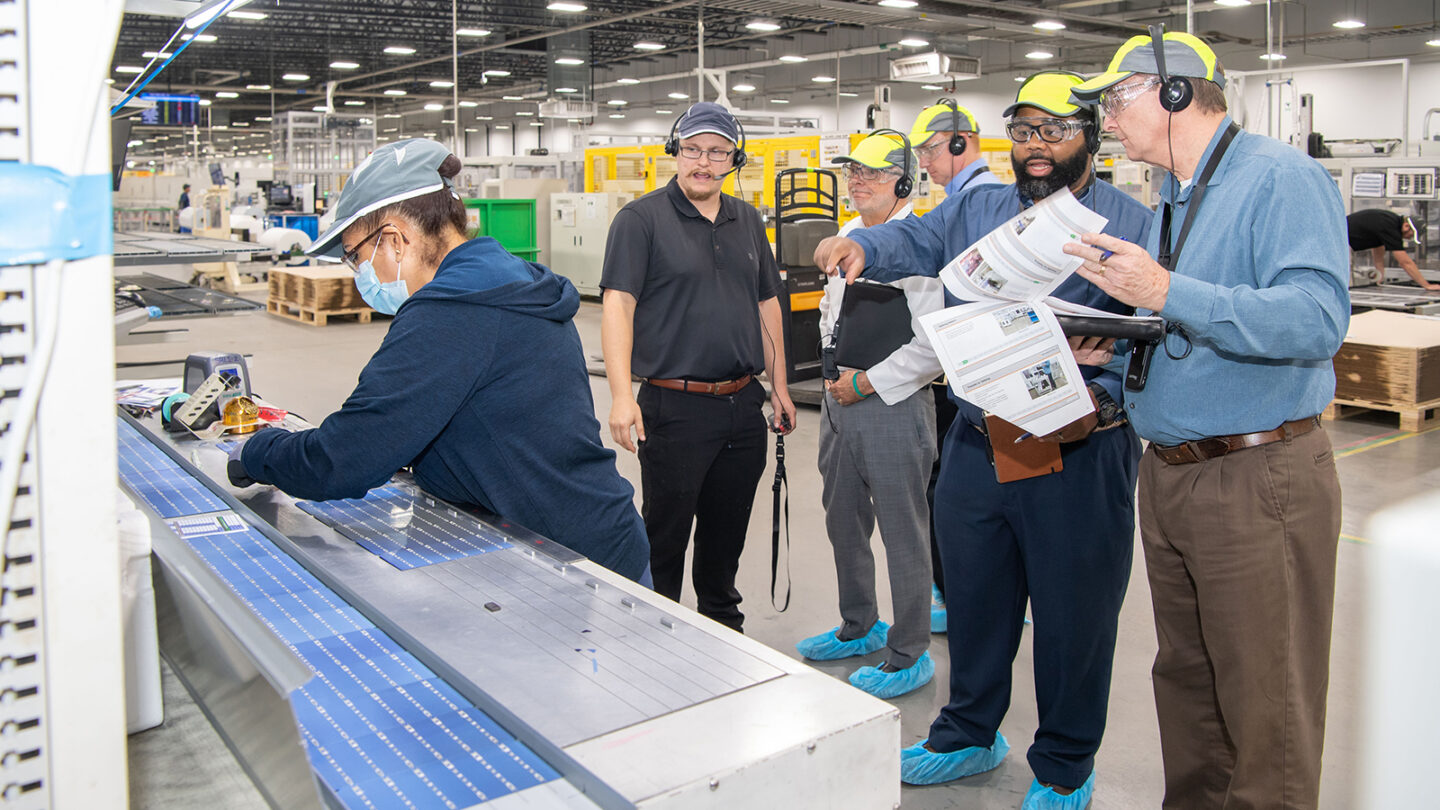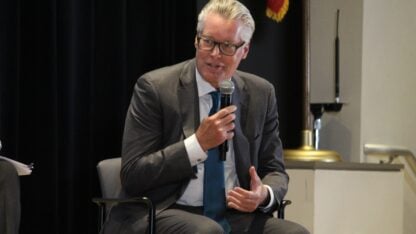The innards of several cars recently sat on a series of long tables in the middle of a warehouse near Savannah. The first chunk of metal was totally stripped bare, an unidentifiable collection of frames, connectors, hinges and tracks. But down the line, each got more complete, until it was clear that, with some upholstery, this would be the front seat of a car.
It’s all to help teach Georgia workers.
“They are going to learn how to assemble and install the seating systems that will go into the Ioniq Six,” explained Rodger Brown, executive director of Quick Start, the state’s workforce training program.
The Ioniq Six is Hyundai’s electric car that will eventually be built at the company’s new “meta plant,” which is under construction about an hour away. But until that factory’s done, no one’s building electric vehicles in this area — so the new employees Hyundai is hiring will go to the training site first to learn the ropes.
The Hyundai plant is just one of a string of factories Georgia has attracted in the last few years that will make EVs and parts, solar panels and more. They’re multi-million dollar investments that promise thousands of new jobs — most of which require training. Quick Start, a state-funded program and part of the technical college system, is part of the incentive program that draws these manufacturers to the state.
“I would argue that the Quick Start program is one of the best tools that we have in our toolkit when it comes to luring companies to our region,” said Trip Tollison, the head of the Savannah Economic Development Authority. “And I say that because it’s the best workforce training program in the country.”
Founded in the 1960s as part of an effort to attract manufacturers to diversify Georgia’s agriculture-heavy economy, Quick Start is the oldest program of its kind in the country, according to the state Department of Economic Development. The program works with each new company to develop training materials, from classroom and video lessons to hands-on work.
At the Hyundai training site, a classroom area sits at one end of the large space. Elsewhere sit disemboweled doors, bare car frames and walls of electrical connectors and metal rivets for trainees to practice on. They’ll start with manual torque wrenches, even though on the real factory floor they’ll use automatic power drills.
“For them to gain understanding, we show them manually how it’s done,” said Brandon Chadwick, a Quick Start training coordinator.
Like learning long division before your math teacher lets you use a calculator, the new employees learn the fundamentals of their jobs in the classroom first, then manually, before finally mastering the tools they’ll use on the factory floor. That way, Chadwick and Brown said, they’re ready for the fast-moving assembly line.
“Imagine they came from, say, McDonald’s or some retail industry,” said Chadwick. “They can come here and we will get them up to speed so that they can be automotive manufacturing professionals.”
Crucially, this training starts before the plants where they’ll work even exist.
“They have an experience as if we brought them into our factory and onboarded them,” said Lisa Nash, the head of HR at the Dalton, Georgia, factories of QCells, a solar panel manufacturer.
Quick Start trained workers at the company’s first Georgia factory and is training more for its new expansion. Nash said the program is especially important during a ramp-up, when the company is hiring hundreds of new people at once and the factory is still under construction.
Without Quick Start, “I would never, never be able to train the volume of people,” she said. “It would have delayed our ramp-up significantly.”
Delays aren’t just bad for the company’s bottom line. The race to cut carbon emissions to fight climate change is urgent, and solar panels and electric vehicles are essential.
There are also billions of dollars in federal funding on offer for green technology. And if there aren’t people ready to work in these new industries, said Joseph Kane of the Brookings Institution, the money could go to waste.
“This transition is going to happen, and there’s going to be a need for this labor. Period,” he said. “The question is, are places going to be ready, intentionally, to get ahead of that, to be proactive about it, rather than being reactionary and kind of like scrambling.”
Quick Start gives Georgia a leg up, at least in manufacturing. It also gives a leg up to individual workers like Robert Howey. He used to work in carpet manufacturing in Dalton before he got a job at QCells.
“I was pretty nervous coming into the solar industry,” he said. “I had no idea about the process or how the solar panel was even made.”
He said the Quick Start training launched him into work he’s more invested in than carpets. He’s since been promoted — and now, he’s helping Quick Start train Georgia’s new green workforce.
“It was a good job for me,” he said of his prior work in the carpet industry. “But solar became my career.”









